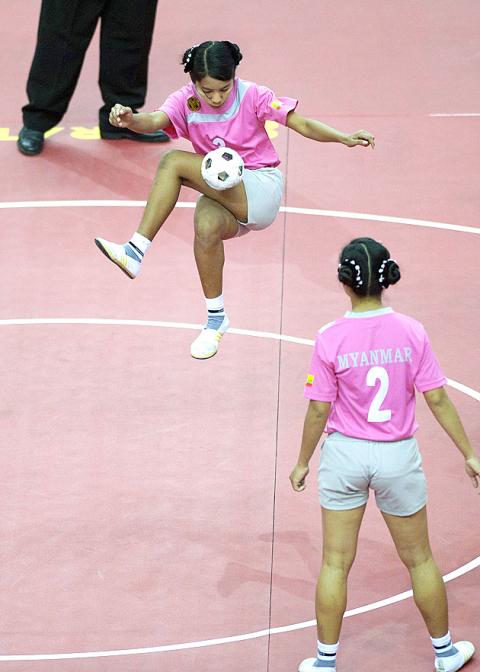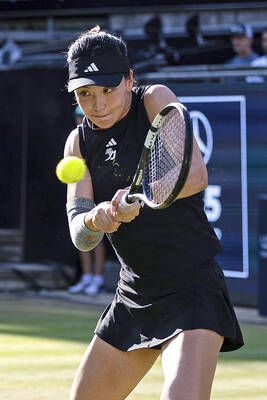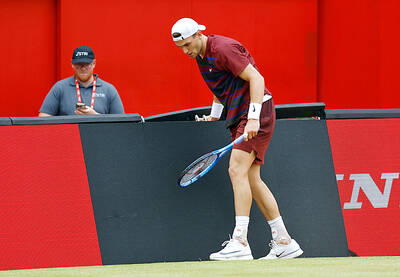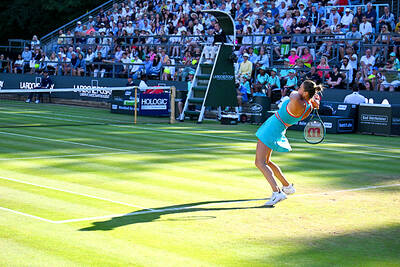To purists, it is a non-competitive pastime in which beauty outweighs victory, but to others, Myanmar’s enigmatic ball game chinlone is a source of pride that has already brought the host nation a clutch of gold medals at the Southeast Asian Games.
A mesmerizing form of keepy-uppy with a cane ball among six players, the sport is one of a welter of disciplines unknown to the wider world, but popular within the region.
The roster at this year’s Southeast Asian Games in Myanmar is peppered with obscure non-Olympic sports, such as martial arts vovinam, wushu and pencak silat — an Indonesian fighting skill — as well as another more widely played cane ball game, sepak takraw.

Photo: AFP
The regional sporting extravaganza has returned to the country after a 44-year absence, marking another landmark in Myanmar’s opening up after decades cloistered by paranoid generals.
Desperate to showcase chinlone, Myanmar lobbied hard for its inclusion in the Games as a “culturally specific” sport, sparking allegations from outraged rivals that the hosts were cherry-picking events for its athletes.
While it is not alone in its use of feet to juggle a ball, chinlone’s uniqueness is revealed in its high kicks, balletic overhead touches and precise exchanges between players, who gracefully swap positions or rotate around a circle. It holds a hallowed place in Myanmar as a recreation casually played on roadsides everywhere, but also for its almost meditational quality, which is revealed through the concentration required to repeat the moves over long periods.
The game is so idiosyncratic that formal rules had to be crafted for the games in Naypyidaw, such as the introduction of an opposition, scoring system and defined playing area.
However, its inclusion posed a sizeable challenge to the other six nations who signed up for the discipline.
“They had to learn it from scratch,” said Boonchai Lorhpipat, deputy president of the international sepak takraw federation — under whose banner the sport has fallen, as it also uses a cane ball.
“Some of the basic skills are the same as sepak takraw, but the game is very different,” he said. Officials had to make the game “umpire-able,” he added, with rules including restricting the game inside two concentric circles, introducing scores across three sets and holding a parallel game to act as the opposition.
Fans have gloried in the staging of the game, filling a purpose-built indoor arena to cheer Myanmar’s men’s and women’s chinlone teams.
There are now calls for it to be included on a more regular basis in the Southeast Asian Games, which are held every two years.
Somewhat predictably, Myanmar hoovered up six golds, helping fire the country to an early lead in the medals table in a competition that inspires fierce regional rivalry, but goes all but undetected in the wider sporting world.
“As a Myanmar woman, I’m delighted to win this medal... I don’t have words to describe my happiness,” a jubilant Khine Win Thu said after claiming gold in a women’s event on Monday.
The team cruised past Thailand, with the ball hitting the floor only a handful times in the 30 minutes of play.
To chinlone masters, the sport is a metaphor of sorts for their country, which has undergone sweeping political and economic reforms since 2011.
“It’s a complex, delicate and difficult game,” Myanmar head chinlone coach Khin Muang Win said.
“People do not know about this tradition... [but] I believe the world will get to know Myanmar better through chinlone,” he added.

Twelve days after winning her second Grand Slam title at the French Open, Coco Gauff fell at the first hurdle on grass in Berlin on Thursday as beaten Paris finalist Aryna Sabalenka advanced to the quarter-finals. Recipient of a first round bye, American Gauff lost 6-3, 6-3 to Chinese qualifier Wang Xinyu as world number one Sabalenka beat Rebeka Masarova 6-2, 7-6 (8/6) in her second round tie. Winner of 10 main tour titles, including the US Open in 2023 and the WTA Finals last year, Gauff has yet to lift a trophy in a grass-court tournament. “After I won the first

While British star Jack Draper spent the past week trying to find rhythm and comfort in his first grass tournament of the season at the Queen’s Club Championships in London, Jiri Lehecka on Saturday bulldozed everything in his path. After more than two furious hours of battle, their form was reflected in the final scoreline as Lehecka toppled a frustrated Draper, the second seed, 6-4, 4-6, 7-5 to reach the biggest final of his career, against Carlos Alcaraz. Lehecka is also the first Czech to reach the men’s title match at Queen’s since Ivan Lendl lifted the trophy in 1990. Draper, who

Top-ranked Aryna Sabalenka staged a “crazy comeback,” saving four match points before beating Elena Rybakina 7-6 (6), 3-6, 7-6 (6) in the quarter-finals of the Berlin Open on Friday. Sabalenka was 6-2 down in the final-set tie-breaker, but won six straight points to reach her eighth semi-final of the season. “Elena is a great player and we’ve had a lot of tough battles,” Sabalenka said. “I have no idea how I was able to win those last points. I think I just got lucky.” “I remember a long time ago when I was just starting, I won a lot of matches being down

The Canterbury Crusaders edged the Waikato Chiefs 16-12 in an intense Super Rugby Pacific final battle in Christchurch yesterday to claim their 15th title in 30 years of the Southern Hemisphere competition. Hooker Codie Taylor scored a try and Rivez Reihana contributed 11 points from the kicking tee as the most dominant team in Super Rugby history extended their perfect home playoff record to 32 successive matches since 1998. The Chiefs, who were looking for a first title since 2013, scored first-half tries through George Dyer and Shaun Stevenson, but were unable to register a point after the break and fell to